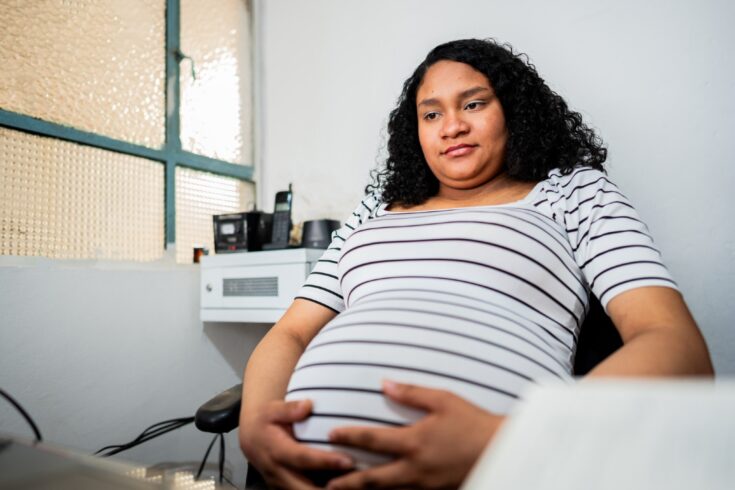In the UK, Black and Asian women face significantly higher mortality risks before, during, and shortly after childbirth.
Black women are three times more likely to die, and Asian women are twice as likely, compared to their White counterparts.
Similarly, pregnant women who do not speak English or prefer another language face significant risks and barriers when accessing natal healthcare.
Barriers to care
These barriers result in higher risks of complications and death.
The National Maternity and Perinatal Audit (PDF, 884KB) said:
Pregnancy remains very safe in the UK but not equal.
There are differences in maternity outcomes for women, and their babies, from different ethnic groups and those who live in more deprived areas.
The disproportionate death and care of ethnic and migrant mothers-to-be in the UK is a result of intersectional challenges relating to:
- systemic bias
- socioeconomic factors
- language barriers
- pre-existing health conditions
- access to care
Work, however, is being done to come up with much-needed practical and equitable solutions.
Addressing urgent care needs
The Arts and Humanities Research Council (AHRC) funded Reproductive Borders and Bordering Reproduction project is based at Queen Mary University of London and led by Dr Camillia Kong. The project addresses the urgent need for improved methods to meet the health needs of pregnant minority ethnic and migrant women in the UK.
This project aims to understand the varied and complex experiences that minority ethnic and migrant women go through during different stages of reproduction and within the reproductive healthcare system.
Innovative methods and techniques
The project employs innovative methods that include vital inclusions of women’s lived experiences, such as the ‘call and response’ technique.
This technique involves interactive exchanges between researchers and participants which enhances engagement by collecting invaluable lived experience data.
These insights will be used to create sensory archives and hold arts-based workshops. They will encourage dialogue among minority ethnic and migrant women, NHS professionals, policymakers, and the public, fostering a deeper understanding of the issues.
Impact and goals
The project is in line with the NHS pledge to improve equity and race equality for mothers and babies and aims to raise awareness, deepen understanding, and guide future policies.
The project will also train early career and postgraduate researchers, delivering on both AHRC research and training goals.
Ultimately, this will enhance legal, ethical, reproductive, antenatal, and postnatal care in the UK.
Personal stories and advocacy
The project is collecting detailed information on the experiences of minority ethnic and migrant women before, during, and after childbirth by bringing together experts from various fields to explore how legal and racial prejudices impact access to and the quality of healthcare.
The Reproductive Borders and Bordering Reproduction project has collected and archived first hand accounts of these difficult experiences through the call and response research method.
Rani’s story
Rani discusses the heavy responsibility of having to insist on being heard and negotiate care with healthcare staff, upon which her life and her baby’s depend:
I feel like I have to go the extra mile to prove myself because I’m a person of colour and I’m an immigrant (…) I have to always do that extra work to prove myself, to make sure that I’m worthy of being [taken seriously]…which is so frustrating and so, taxing cognitively.
Rani reflects on the lack of after-care she experienced after nearly losing her baby and potentially her own life, due to her medical concerns being dismissed and ignored by healthcare staff:
I just felt like a vessel, and I just felt like I’ve popped the baby out, that’s it, I’ve done my job and I’ve just been left in the corner to just recover by myself.
Leila’s story
Leila’s experience of improved treatment in maternal healthcare spaces when accompanied by her white husband:
Everyone, kind of, breathes a bit easier [when a white person/partner accompanies a racialised woman].
Ayra’s story
Ayra discusses how pregnancy healthcare spaces, such as labour wards and pre and post natal care facilities, can feel acutely risky for women of colour:
Why don’t I speak up’, is it because of the risk? Your life is in their hands.
These sentiments, shared by many, highlight the physical, cognitive and emotional toll the reproductive healthcare system can take on minority ethnic and migrant women.
The project’s collection and analysis of women’s personal stories is essential for ensuring that policy changes in maternal healthcare effectively address existing stark inequalities.
The benefits of this model align with wider AHRC strategic priorities, connected to the government’s NHS Mission, including in our £30 million Mobilising Community Assets Programme.
Advocacy and conversations around these policy changes are crucial to tackling these healthcare disparities.

